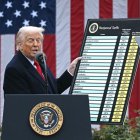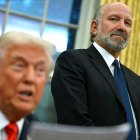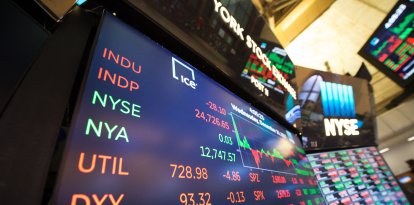Global markets react cautiously to court ruling to block Trump's tariffs
However, sectoral levies on steel, aluminum and automobiles remain in place.

IBEX 35 in Madrid, Spain (Archive)
World stock markets showed a modest response Thursday following a U.S. court's decision to block most of the reciprocal tariffs imposed by President Donald Trump.

Politics
Federal court blocks Trump's global tariffs on the grounds that they exceed his legal authority
Luis Francisco Orozco
The White House quickly appealed the U.S. Court of International Trade ruling, issued Wednesday, creating uncertainty about the future of these measures.
Although the ruling blocked Trump's use of emergency powers to implement tariffs, the sectoral levies on steel, aluminum and automobiles remain in place.
On Wall Street, U.S. indexes closed mostly higher. The Nasdaq stood out with a rise driven by a solid earnings report from Nvidia, reflecting strength in the artificial intelligence-linked technology sector.
However, the Dow recorded losses. In Asia, Japan's Nikkei 225 and South Korea's Kospi each rose 1.9%, the latter also supported by a rate cut by the Bank of Korea to stimulate the economy.
Meanwhile, the main European indexes closed with slight declines on a day marked by the Ascension holiday, which reduced stock market activity.
In the bond market, yields on 10-year Treasury bonds fell slightly from 4.47% to 4.44%, and two-year yields, which are more sensitive to expectations about Federal Reserve rates, fell from 3.96% to 3.94%.
Kathleen Brooks, research director at XTB, noted that gains in the markets were "less euphoric and more subdued than expected."
She also warned that the legal challenge to the tariffs could start a protracted dispute between the courts and the White House, maintaining uncertainty over trade policies. "Tariffs will continue to weigh on the global macroeconomic outlook for some time," Brooks said.
China, the main target of Trump's measures but benefiting from temporary relief, urged Washington to "cancel unfair unilateral measures completely."
In Europe, markets internalized that the ruling is not final, which limited more pronounced reactions.
The Trump Administration's speed in appealing the court ruling
The court gave the White House 10 days to halt the tariffs, although the executive is confident of recourse, since, "the trade deficits experienced by the United States have created a national emergency that has devastated American communities.”



























